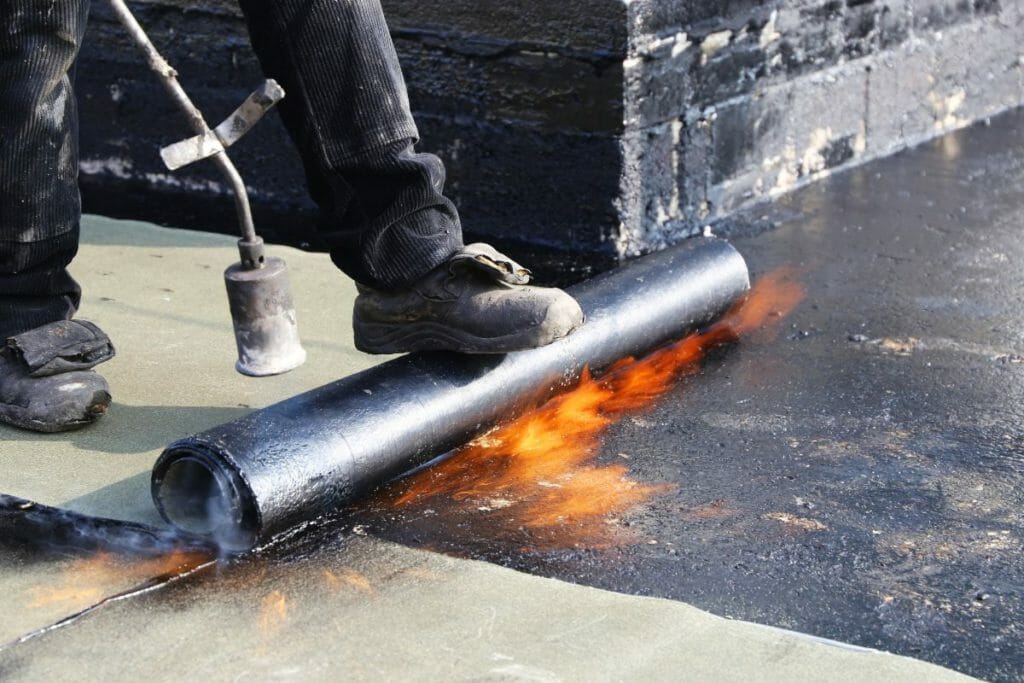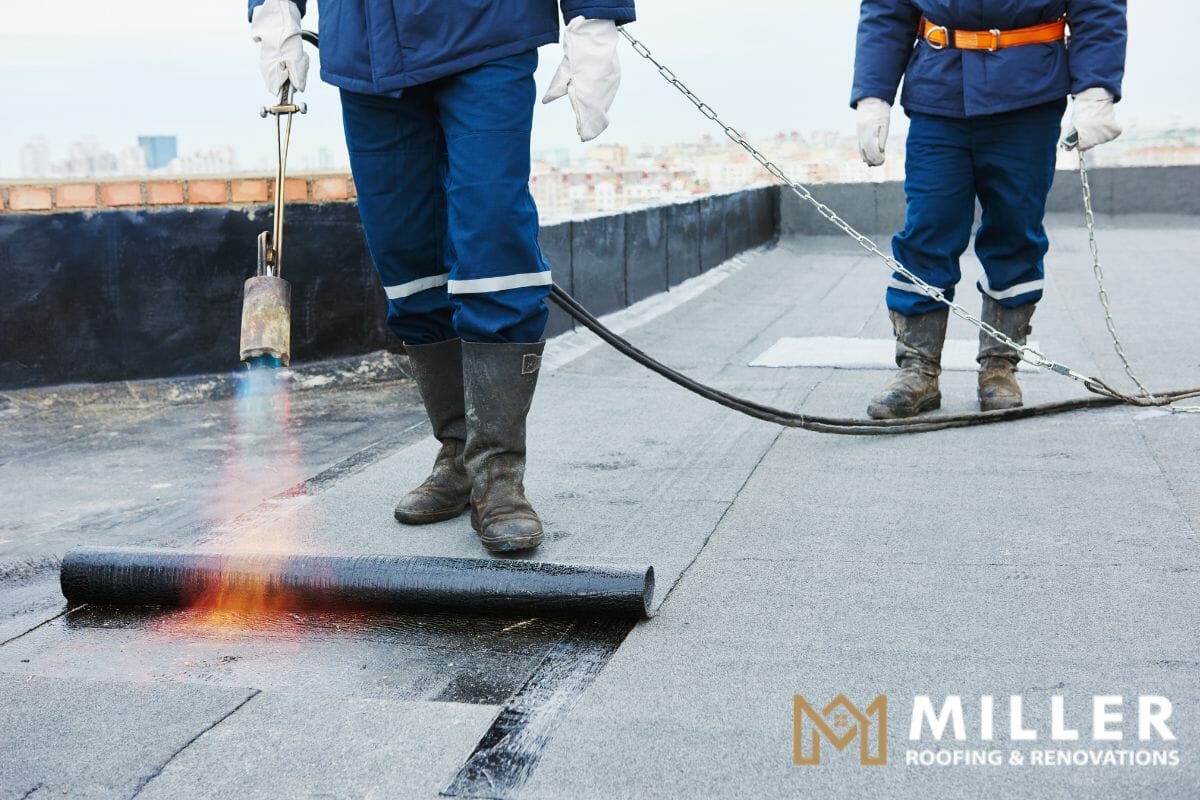There are a lot of options available when it comes to commercial roofing. Modified bitumen is one of the most popular roofing materials in the country, is easy to install, performs well in all kinds of weather conditions, and is durable. Before you commit to this roofing material, you should know about certain things, such as what modified bitumen roofing is, how it’s made, and how much it costs.
At Miller Roofing and Renovations, our team strives to give you the best information possible. This guide will help you make an informed decision about whether modified bitumen is suitable for your commercial property or not, and how we can help with all of your commercial roofing needs.
What Is A Modified Bitumen Roofing System?
A Modified bitumen roofing system is a kind of asphalt-based roofing material that is manufactured to be used on commercial and industrial buildings. The term “modified” refers to the fact that they contain additives or polymers. These are added to the bitumen (asphalt component) to help them adhere better to roofs. The polymers enhance or modify the existing roofing material, which helps them become more durable and last longer.
Modified bitumen serves as an advancement to the existing asphalt shingles-based systems. The modified bitumen roofing membrane first came into existence in the mid-1960s in Europe, and it came to use in North America a little later, in the 1970s.

Pros and Cons
Let us discuss the core advantages and disadvantages of this roofing system!
Advantages Of Modified Bitumen Roofing
If you’re looking for a durable, long-lasting, and easy to install roofing material, look no further than modified bitumen. Modified bitumen is an excellent option for roofs of all shapes and sizes, especially for flat roofs. Here are some advantages of a modified bitumen roof system:
Durable
Modified bitumen roofing is durable and made to last. It’s designed to withstand extreme temperatures and weather conditions such as rain and storm damage in Tennessee.
Modified bitumen is made from asphalt, which is a petroleum-based product. It’s mixed with other polymers and materials to create a strong, flexible material that you can roll out onto roofs in one continuous sheet. It also offers better tear resistance than other systems. Also, modified bitumen roofing can handle foot traffic well because it is made up of multiple layers.
Protection Against UV Radiation/ UV Rays
UV rays can dry out different types of roofing material or roof coatings, causing your roof to deteriorate faster. Rapid aging leads to frequent roof repairs, and can even make roof replacement necessary much quicker. To avoid this, you need a tough and resistant roofing material. Modified bitumen roofs can also help protect your home against harmful UV rays. It does not break down easily and is less prone to degradation than other types of roofing materials.
Thanks to its reflective capabilities, modified bitumen will not only help your roof to last longer, but it also plays a part in energy savings as well. You can also use roof coatings to enhance the roof’s reflective properties further.
Effective Against Water Damage
Modified bitumen roofing is a waterproof material that is ideal for use on commercial and other low-sloped roofs. Since modified bitumen comes in the form of rolls that spread on the roof, there will not be many seams, the area of the roofs that are most vulnerable to roof leaks. Seamless areas fare better against water damage, and they do not leak easily. So the chances of water damage are low.
Modified bitumen is ideal for flat roofs, especially those that experience heavy snow accuminulation or high winds. It’s also great for commercial buildings because it can withstand heavy weight and harsh weather conditions.
Versatile
Modified bitumen membranes are one of the most versatile roofing materials available in the commercial roofing industry. You can install modified bitumen roofing on roofs of different sizes.
You also have a lot of flexibility when installing modified bitumen roofs. This is because multiple methods are involved, such as the hot-application method, the cold-application method, and the peel-and-stick approach, which we will discuss in the following sections.
Flexible Nature
The modified bitumen roofing system is known for its flexibility. The material is made from asphalt and advanced polymers, which means that it’s incredibly durable and resistant to damage from the elements.
It can withstand both hot and cold weather conditions well, and it fares well during frequent high-temperature changes that tend to crack or damage roofing membranes.
Environment-Friendly
One of the most significant advantages of a modified bitumen roof is that it is environmentally friendly. If you are looking for a material that can protect your commercial property and reduce the carbon footprint, you should consider this material. Unlike some other roofing products, modified bitumen can be recycled and used again so it will not contribute to the already large landfills.
Disadvantages Of Having A Modified Bitumen Roofing System
While it may seem like the perfect solution for your business, modified bitumen roofing does have some disadvantages that you should be aware of before you decide on this type of roof membrane for your business.
A Relatively Shorter Lifespan
The first disadvantage of modified bitumen roofing is its relatively short lifespan. With proper maintenance, you can expect your modified bitumen roof to last for about 15-25 years. This may be less than other popular roofing materials, such as TPO roofing materials and EPDM. When you look for a roof for your commercial building, one of the most important things you must consider is the roofing material’s lifespan.
Can Absorb Heat
As you may know, modified roof membranes’ standard color is black or darker shades. Due to the black color of the roof membrane, the roof will absorb more heat. This can be beneficial in winters with cold temperatures, but it can cause problems in the summers as temperatures rise.
Types of Modified Bitumen Roof Systems
A modified bitumen roof system is a roof membrane that combines asphalt roofing material with polymers. Now there are different types of polymers used to modify the material. Experts categorize the type of material based on the polymers. These are broadly classified into two parts: APP-modified Bitumen and SBS-modified.
APP Modification Roof Membrane
APP stands for Atactic Polypropylene. It is a type of thermoplastic material with broad applications. This is also known as plastic asphalt. APP is not as elastic as its counterpart, but it does well in high temperatures. APP-modified bitumen roofing also offers UV protection. The one drawback is that this material is less flexible. You can install this roof with a hot-application method, but it is not advisable.
SBS Modification Roof Membrane
SBS stands for Styrene-Butadiene-Styrene. It is a type of synthetic rubber. While APP is hot asphalt, you can call SBS membranes rubber asphalt. It is a type of elastomer that offers excellent elasticity and resistance. With an SBS system, you get better flexibility and cold temperature resistance. You can use both hot and cold adhesive methods for installation. So when the chilly winter sets in, the roof will not crack or become brittle. An SBS sheet can be a good option if you have a commercial building with a larger area prone to heavy loads.
Methods Of Installation
There are three main methods for Modified Bitumen installation, and we have explained them below.
Torch Application
This is one of the most common ways asphalt-based products are applied. This is also known as the hot application method. The roofing contractor will use a propane torch to heat the adhesive and melt the underside. The melted sheet is then simultaneously spread on the existing substrate. APP-modified bitumen is installed using this method.
However, there is a considerable risk of fire involved using this method. It is important to ensure no flammable items are nearby, and that you choose a contractor that takes all proper precautions.
Cold Application (Cold Applied Adhesives)
Cold adhesive is the most common method of applying modified bitumen roofing. Cold application (also known as cold-applied adhesives) is a process in which bitumen is applied to the roofing surface before the roof is placed. The bitumen is spread with a squeegee, rolled or sprayed onto the roofing surface, and then immediately covered with additional roofing materials.
Peel and Stick Method
One of the latest modified bitumen attachment methods is the peel and stick membrane, which is a flexible sheet that adheres to the roof deck without any heat or adhesive. The adhesive is pre-applied on the sheet. The peel-and-stick membrane offers several advantages over other modified bitumen attachment methods. It’s easier to apply than other methods and requires less maintenance.
Modified Bitumen Cost
Modified bitumen roofing is a relatively inexpensive way to cover your roof when compared to other roofing materials. The price of modified bitumen roofing varies depending on your property’s size, location, etc., but it generally costs between $4 and $8 per square foot. However, this is just an estimate and cost may depend on other factors as well.
We Install The Best Roofs
When you’re looking for a contractor for your modified bitumen roofing project, it’s essential to find one who is licensed and insured. In addition, you must make sure the contractor has experience with this type of roofing material.
Miller Roofing and Renovations has all the qualifications of the best roofing company in Collierville, TN. Our team has years of experience in the roofing industry, and we take pride in our work. We are the best choice when it comes to offering modified bitumen roof installation services. Contact us today at (901) 457-9405 to learn more about us, or to book an appointment for a free roof inspection.



 FREE ESTIMATE
FREE ESTIMATE